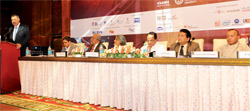 The session deliberated on strategies for Education Leadership across different countries to come together and harmonise efforts in bringing cordial relations in education and leadership. It highlighted the strategies of governments from different countries in promoting school education and higher education and their vision for education in the future.
The session deliberated on strategies for Education Leadership across different countries to come together and harmonise efforts in bringing cordial relations in education and leadership. It highlighted the strategies of governments from different countries in promoting school education and higher education and their vision for education in the future.
|
MODERATOR: Special Guest: Eminent Panelists:
Loynpo Thakur S Powdyel, Hon'ble Minister of Education, Ministry of Education, Royal Government of Bhutan |
The Global Education Leaders' Conclave aimed at building policies and partnerships for promoting education on the global platform.
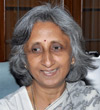 Vibha Puri Das started the session highlighting the issues pertaining to higher education in India. For universalisation of primary and secondary education and improvement in the GER (Gross Enrolment Ratio), “we have to look at strategies that will enable us to achieve these goals.” Smt Das concluded by emphasising on skill delivery to improve GER. Skill delivery should be done in a sustainable manner to ensure vertical, horizontal, diagonal mobility for students from skill to education and back again. Connectivity amongst institutions excellence in terms of optical fiber networks, teaching learning methods and national leaning network is being actualised.
Vibha Puri Das started the session highlighting the issues pertaining to higher education in India. For universalisation of primary and secondary education and improvement in the GER (Gross Enrolment Ratio), “we have to look at strategies that will enable us to achieve these goals.” Smt Das concluded by emphasising on skill delivery to improve GER. Skill delivery should be done in a sustainable manner to ensure vertical, horizontal, diagonal mobility for students from skill to education and back again. Connectivity amongst institutions excellence in terms of optical fiber networks, teaching learning methods and national leaning network is being actualised.
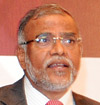 Dr Narendra Jadhav discussed all the four sectors of education. “We will be precisely involving education in the 12th plan.” Elementary education have two schemes – Sarva Shiksha Abhiyan and Mid Day Meal scheme – which have been implemented across the country. Rashtriya Madhyamik Shiksha Abhiyan introduced in the 11th plan will continue to impact education.
Dr Narendra Jadhav discussed all the four sectors of education. “We will be precisely involving education in the 12th plan.” Elementary education have two schemes – Sarva Shiksha Abhiyan and Mid Day Meal scheme – which have been implemented across the country. Rashtriya Madhyamik Shiksha Abhiyan introduced in the 11th plan will continue to impact education.
The PPP mode can be beneficial to the country with the premier Kendriya Vidyalays and Navodya Vidyalays. He concluded by sharing his insights on brining excellence in higher education, which needs to be addressed by holding research programs to reinforce teaching programs using technological learning methods. “We need to further facilitating investments by private institutions in higher education as resource limitation is a reality and identification of good PPP models is important.”
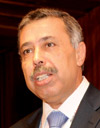 Dr Taseer Al Nuiami focused on educational reforms globally. The fee policy needs to be revised as education is the basic human right. Incentives for innovation, for reaching the target, for teachers need not necessarily be financial but May be technological for better teaching methods.
Dr Taseer Al Nuiami focused on educational reforms globally. The fee policy needs to be revised as education is the basic human right. Incentives for innovation, for reaching the target, for teachers need not necessarily be financial but May be technological for better teaching methods.
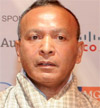 Loynpo Thakur S Powdeyl concluded the session with his vision on education. He said that if we set education right, we can set our nation right. Education must be taken to the next higher level of engagement than merely being a mercenary pursuit of degrees and diplomas unrelieved by light and learning. “What we really need is a new civilization- an educational civilization, if you will. The hope is that our children and youth exposed to these learning experiences will imbibe the right kind of knowledge to make them better actualized and more fulfilled human beings.”
Loynpo Thakur S Powdeyl concluded the session with his vision on education. He said that if we set education right, we can set our nation right. Education must be taken to the next higher level of engagement than merely being a mercenary pursuit of degrees and diplomas unrelieved by light and learning. “What we really need is a new civilization- an educational civilization, if you will. The hope is that our children and youth exposed to these learning experiences will imbibe the right kind of knowledge to make them better actualized and more fulfilled human beings.”





















